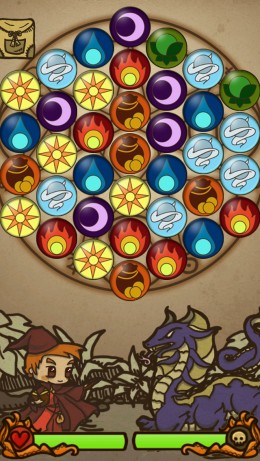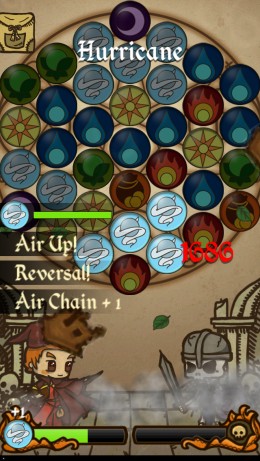 One of the most unexpectedly wonderful genre mash-ups has proven to be the puzzle-RPG. On the surface, they seem like peanut butter and cheese, with puzzle games of the past emphasizing a play experience where a full game can be completed in one session, and RPGs pretty much being the reason the ability to save your game progress was invented. These genres existed beside each other for decades before the idea of smashing them together became popular thanks to Puzzle Quest. After that, the floodgates opened, especially on iOS, to the point where many of the most popular titles around are of this particular hybrid. The good ones find a way to bring a twist to the table, and such is the case with Glyph Quest (Free).
One of the most unexpectedly wonderful genre mash-ups has proven to be the puzzle-RPG. On the surface, they seem like peanut butter and cheese, with puzzle games of the past emphasizing a play experience where a full game can be completed in one session, and RPGs pretty much being the reason the ability to save your game progress was invented. These genres existed beside each other for decades before the idea of smashing them together became popular thanks to Puzzle Quest. After that, the floodgates opened, especially on iOS, to the point where many of the most popular titles around are of this particular hybrid. The good ones find a way to bring a twist to the table, and such is the case with Glyph Quest (Free).
Interestingly, the way Glyph Quest is set up, your initial period with it is probably going to be the least remarkable. You play as a mage-in-training, off to battle monsters for fun and profit. All of your spells are cast by matching orbs of various elements. Depending on how many orbs you match at once, you will do various levels of damage to the enemy. Each stage has a handful of enemies that you have to take down without getting killed. Winning a battle awards you with gold and experience. You can use the gold to buy items and upgrade your equipment, while the experience goes towards increasing your level, which brings a bigger life bar, access to new stages, and the chance to buy better gear.
 When you start the game, your battle options are fairly limited. You can only match three orbs at once, and there must not be more than one element mixed in or you’ll just end up misfiring or damaging yourself. You can create chains by matching the same element in successive turns, or by matching the opposite element. At this point in the game, enemies don’t do much more than attack you each turn, giving the appearance of a very simple and derivative experience. As you level up and expand your abilities, however, the game really opens up. Enemies start getting tougher and use lots of dangerous status afflictions on you, adding some serious challenge to the fights. Fortunately for you, your skills also start widening out, allowing you to make matches with even more orbs as well as letting you make special mixed-element spells, though you’ll still take damage if you match opposite elements. Experimenting with mixing elements to see what kind of cool spells they produce is really fun, and adds considerably to the game’s strategy.
When you start the game, your battle options are fairly limited. You can only match three orbs at once, and there must not be more than one element mixed in or you’ll just end up misfiring or damaging yourself. You can create chains by matching the same element in successive turns, or by matching the opposite element. At this point in the game, enemies don’t do much more than attack you each turn, giving the appearance of a very simple and derivative experience. As you level up and expand your abilities, however, the game really opens up. Enemies start getting tougher and use lots of dangerous status afflictions on you, adding some serious challenge to the fights. Fortunately for you, your skills also start widening out, allowing you to make matches with even more orbs as well as letting you make special mixed-element spells, though you’ll still take damage if you match opposite elements. Experimenting with mixing elements to see what kind of cool spells they produce is really fun, and adds considerably to the game’s strategy.
In addition to matching orbs, you can also spend your turn using an item. Items can be bought in the shop or found by matching item orbs, and can be used for various effects, including dealing damage, healing, clearing status effects, and others. Upon starting the game, I was a bit worried about the items being a drain on the cash supply, but you’ll usually find more than you can actually carry just by making matches, and healing potions are among the most common item you’ll come across this way. Items are incredibly useful as you get into the later stages of the game, as enemies can get pretty tough, particularly if you don’t get a good layout from the RNG gods.
 Glyph Quest is free to download, but only lets you achieve a certain level before offering its unlock key for a couple of dollars. As I mentioned before, the game is at its least interesting in this free part, which might not have been the best way to do things. The game truly reaches its full potential when you can buy the element-mixing ability, something that comes a bit later than that free cut-off, so if you try it out and you aren’t quite impressed, keep that in mind. The unlock key is the only IAP in the game, though, so don’t worry that it’s balanced for grinding or anything like that. Unless you go hog wild on consumable items, you should never really have much in the way of financial woes.
Glyph Quest is free to download, but only lets you achieve a certain level before offering its unlock key for a couple of dollars. As I mentioned before, the game is at its least interesting in this free part, which might not have been the best way to do things. The game truly reaches its full potential when you can buy the element-mixing ability, something that comes a bit later than that free cut-off, so if you try it out and you aren’t quite impressed, keep that in mind. The unlock key is the only IAP in the game, though, so don’t worry that it’s balanced for grinding or anything like that. Unless you go hog wild on consumable items, you should never really have much in the way of financial woes.
The presentation in Glyph Quest is simple and clean. The color palette is quite muted for everything but the orbs, but the character art still manages to pop with its simple yet detailed aesthetic. There’s very little animation except for some minor effects when attacks are launched. The music is also quite limited, with just a few pieces on the whole game. It’s decent stuff, nothing too annoying, but not terribly memorable, either. The game features a variety of useful tips to help you understand the ways it differs from the norm, which is quite handy. While there isn’t any Game Center support at the moment, there’s a screen in-game that keeps track of all of the spells and enemies you’ve encountered, encouraging you to find everything you can.
The only real downside to the game is that there isn’t enough of it. It doesn’t take all that long to unlock all the levels and abilities, and once you’ve cleared the stages, there’s not a whole lot more to do. Even rounding out the collection doesn’t involve that much extra playing, as you’ll encounter almost everything just by playing through. I suppose there are worse problems in the world than leaving the player wanting more, and it’s hardly a rare problem in puzzle-RPGs. Apparently an endless mode is on the way in a future update, along with Game Center support, both of which should help temper this particular issue a bit.
If you enjoyed games like 10000000 ($2.99) or Puzzle Quest, give this one a look. It’s free to try, and keep in mind, it gets a lot better once you’re a little further in. It’s made a nice splash in our forums, which you should check out for some tips and advice, along with some information direct from the developer. While the core elements of Glyph Quest are probably still too familiar for some, it’s a fine example of how a small twist can go a long way if it’s done well.